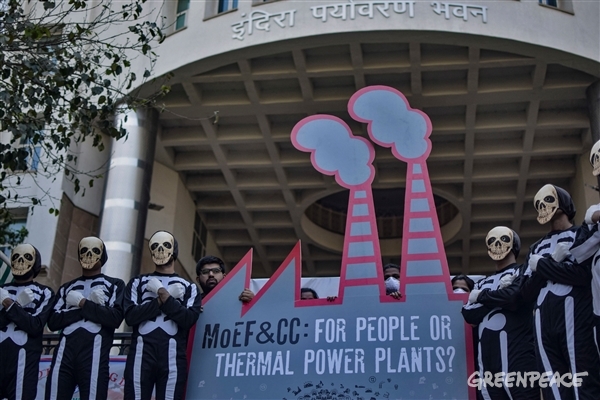Last March, my family forced me to pay a visit to our doctor at Chittaranjan Park in Delhi for a diagnosis of my dry cough. It had been lingering for over two months. The doctor gave me a concerned look from behind his specs and asked whether I had asthma. I indignantly replied that neither I, nor anyone else in my family has ever had asthma. He shook his head gravely and said that I had developed an asthmatic tendency because of the polluted Delhi air. We had been living here for just over eight months! Four months later, as providence would have it, we found ourselves packing our furniture and moving to Bangalore.

Even after moving out, I couldn’t stop wondering what it must be like for children in Delhi, especially during the winters. I also kept feeling that somewhere amidst all the digital revolutions, mobile phones and shopping malls, we have started to accept the larger concerns as they are. We have resigned to our destiny to such an extent that we don’t want to change anything anymore. When they start to really bother us, we just escape from the things we cannot change.
Last week over 100 people in Delhi voluntarily gathered on the premises of the Ministry of Environment, Forests and Climate Change (MoEFCC) for a silent protest, in a bid to end air pollution
There are enough research and data points to prove that coal power plant’s SO2 emissions have significantly increased. The 7th of December 2017, was the deadline set by the government two years back, in order to regulate the emission standards of coal power plants. But, like many other broken promises and shattered hopes, our wait for these regulations and, consequently, clean air, seems nowhere close to an end. Even to this day, strong action has not been taken against those flouting the prescribed norms for coal power plants.
Another winter has come and a few more people have died in accidents on our smog-shrouded highways. For the most part, we have carried on with our lives, as usual.

On the 7th of December, a motley group of citizens from Delhi made up of young college students, activists, mothers of school-going children and well known doctors braved the cold, polluted air and stood outside the MoEFCC. They demanded to know how much longer they must wait before the government will pay any heed to the deaths by slow poisoning more people. They also asked the government to impose accountability on industries and power plants that are one of the primary agents responsible for polluting the air, because, every time the blame seems to be casually shifted onto vehicle owners, and farmers who burn crop stubble once a year.
As the mellow warmth of the winter sun starts giving way to the harsh glare of summer, the word pollution mysteriously disappears into thin air, only to return stronger and even more unforgiving, after every Diwali.
Concerned doctors and the Indian Medical Association have been shouting themselves hoarse, highlighting the health hazards as a result of air pollution. The acute discomfort displayed by players on both sides during the India-Sri Lanka test match only corroborates their concerns. The very fact that the Airtel Marathon and the test match were hosted in Delhi, sufficiently demonstrates the absolute apathy of the authorities towards this killer issue. The current state of implementation of policies and lack of planning by the government, about the crisis of air pollution, is severely limited.
However, change has to begin somewhere.
I am an optimist as far as the power of people is concerned. It is the only thing that has changed the world. It has brought us independence and ensured justice for the likes of Jessica and Nirbhaya. It has, time and again, shaken the relevant authorities to be more accountable.
It was heartening to see hundreds of people of varying age groups, profession and gender gather in front of the MoEFCC on the 7th of December. They, and thousands of citizens who wrote letters to the Minister to remind him of the deadline are a few bold steps towards that change to a cleaner and healthier future. For now, The MoEFCC has moved to the Supreme Court seeking extension of the deadline for polluting power plants.

I am hopeful that if we keep the pressure alive, be relentless, we will soon see a winter in Delhi and other cities where children will be playing outside in the morning sunshine, without their parents having to worry about their health.
We have seen the hashtag #Beatthepollution being loudly proclaimed from the twitter handles of the authorities for quite some time. Our elected representatives have even been visiting conferences abroad to find a solution to these problems. Yet again, we are disappointed to see no natural progress from intent to action.
While many of us as individuals are spending thousands on air purifiers, trying to replace their vehicles with electric cars, braving the crowded public transport, installing solar panels on roofs, isn’t it fair to expect the big industries and power plants to also get a nudge to be responsible for the environment and pull their weight? All we are asking is for them to take proper measures and ensure that their emission quality adheres to the permissible limit.
Is this too much to ask for? Has the health of our children become so unimportant that we have been ignoring their pleas for a bit of clean air to breathe?
Diya Deb is the Campaign Director at Greenpeace India
